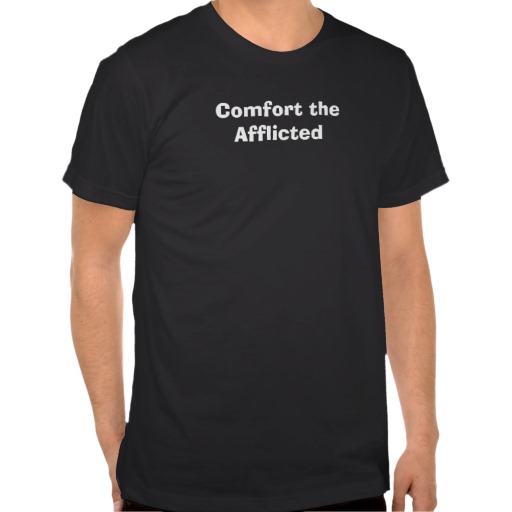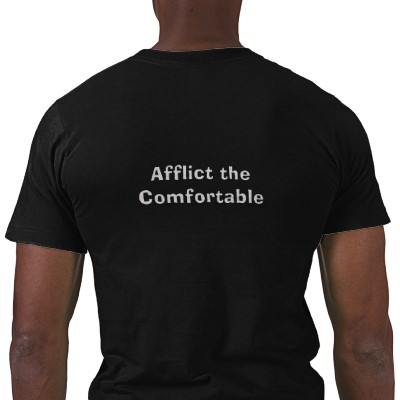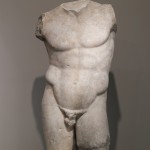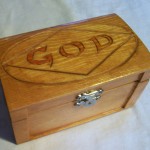[This post is part of the Patheos Pagan November gratitude series. You can check out other contributors to the series here: Jason Mankey, Aine Llewellyn, Christine Kraemer, Nimue Brown, and Julian Betkowski.]
A friend told me that true religion should “comfort the afflicted and afflict the comfortable”. This is what Paganism has been for me. And this is why I am grateful for it.
In the beginning, it was all about comfort. I was leaving Christianity and seeking a balm for my bruised soul. To be fair, my soul was bruised, not because of anything any Christian had done, but because of how I had used Christianity against myself. I was seeking refuge from my perfection complex, from unhealthy notions of sexual purity, and from my own patriarchal consciousness. And the Goddess and her horned Consort accepted me with open arms.
There’s a passage from Jacqueline Carey’s Sundering series (which is kind of like Tolkien from the perspective of the “bad” guys) where the protagonist and leader of the “dark” armies, Tanaros, is talking to the one of the “light” characters, Lady Cerelinde, defending his allegiance to his dark god and master:
“I tell you this, Cerelinde. His Lordship is here. Wounded and bleeding, but here. And he has given shelter to all of us, all whom the world has bent and broken, all who yearn for a Shaper’s love, all whom the world has despised. He demands our loyalty, yes, but he allows us the freedom to question the order of the world, to be who and what we are. Can you say the same of Haomane Lord-of-Thought?”
That was what I was looking for: a god who is here, who is present, a god who suffers with me, and a god who gives me the freedom to question and to be who I am. Of course I realize that this is who Jesus is for many Christians, but I never knew that Jesus. Maybe that Jesus came to me in the form of the Horned God. In any case, in Paganism I found the god to whom I could pray:
Though thou hast anointed my head,
And hast led me down into the valley of the shadow of death,
Thou art my refuge and my repose.
Thy rod and thy scourge have comforted me.
And thou shalt bring me up again,
To green fields and to the waters of life,
And my chalice shall o’erflow.
For thine are the mysteries of life and death.
I am grateful for the comfort and healing Paganism brought me.
But with time, my Paganism has become less about comfort, and more about dis-comfort, or rather about moving me out of my comfort zone. And this is why I am most grateful for Paganism today.
To begin with, I have been challenged by those who I have met through blogging here. When I started blogging, I had a pretty narrow conception of what Paganism was, to say the least. Interacting with you in the comments and with other bloggers has broken down a lot of the assumptions I had about Paganism itself. For example, UU Druid John Beckett has challenged my penchant for drawing artificial boundaries by his merging of deity-centered, earth-centered, and Self-centric (my term) practice. Jason Mankey has challenged the stereotype I had of initiatory Wicca as staid and boring. Joseph Block has challenged the stereotypes I had about heathens as insular and regressive. Peregrin Wildoak has done the same for my stereotypes about occultists as disconnected from the material world. And my interactions with several deity-centered Pagans has helped me appreciate how I can be insensitive to others’ spirituality, even when not intending to. I know you did not set out to broaden my mental horizons, but it happened anyway.
In addition, Alison Leigh Lilly has persistently challenged the unconscious patriarchal/masculinist assumptions in my writing. Lupa at No Unsacred Place, Glen Gordon formerly of Postpagan*, and Elinor Predota and Traci Laird at A Sense of Place have helped me to bring my soaring intellectualizing down to earth … literally. Devotional polytheists like Dver and P. Sufenas Virius Lupus have caused me to consider what role the experience of radical otherness might have in my own Self-centric Paganism. And Jason Mankey constantly reminds me that reverence and revelry can co-exist in the same ritual moment. These are things that do not come naturally to me. These are things I am still working on. But, if it had not been for these people, I might not even be working on them today. I am grateful to all of them and so many more of you for the myriad ways that you have pushed me to grow.
But it’s not just blogging about Paganism that is challenging. The practice of Paganism** itself is challenging. If it weren’t for Paganism, or the part of me that I identify as Pagan, I would likely spend my life in air-conditioned indoors, much of it in a library with my nose in a book or behind a computer screen. I would have little human contact and I would feel dissociated from my own body. That would be miserable, but it would be easy. I’m not one of those people for whom Paganism comes naturally. I have to work at it. And I do work at it, because I need it.
Because of Paganism, I close my book, turn off my computer, and go outside. That may seem trivial, but it has had a profound effect on me. As John Beckett recently wrote:
There is value in going outside and digging in the dirt. There is value in going outside and looking up at the sun and moon and stars. There is value in going outside and watching the squirrels and listening to the birds. There is value in going outside – are you starting to see a pattern here? – and smelling the flowers, lying in the grass, and hugging the trees. This can be challenging in the miserable Texas summers… just as it can be challenging in the miserable Minnesota winters. But when we have a spiritual relationship with Nature, these challenges become something to work with and work around. When we have a spiritual relationship with Nature, maintaining that relationship becomes more important than constant comfort: we learn to go walking before dawn, to greet the rising sun before we begin our work day, to speak to the trees as soon as we get home, and to salute the moon before we go to bed.
And because I get up and go outside, I have found God/dess there.
Being Christian was easy for me in the sense that the Christian God was set apart from the world. I could imagine him to be whatever I wanted (or thought I wanted), and I could project my complexes onto him. But being Pagan is harder, because it forces me to find God/dess not in my imagination, but in the very physicality of the life that I am immersed in: in the wild wind before the spring storms, in the dirt under my fingers, in the warmth of the sun on my face in the morning, in the water flowing over my body from my showerhead, in the flow of air in and out of my chest, in the burn in my muscles as I hike in the woods, in the taste of a ripe pear melting on my tongue, in the beating of my heart, in the flesh of my lover, in the hand of a kindred Pagan grasped in circle, and in the transience this very moment.
And Paganism forces me to see what is there, rather than what I want to see. The God/dess that I find in these experiences is not always the deity that I want. S/he is not the answer to all my questions — at least not an answer that I can put into a ordinary language. S/he does not make life easier and S/he is rarely comforting. But S/he is here. Messy and imperfect, but here. And S/he calls me. S/he calls me to see, to touch, to love, and to be made whole. And for this, I am grateful.
*Glen Gordon is a new columnist at HumanisticPaganism and his first essay, “Death Song”, will be posted next Wednesday. It is really something, so I encourage you to check it out.
**By “Paganism” here, I am talking about what Ian Corrigan at Into the Mound has defined as: “the naturally-occurring religious impulse of a local area”. Ian explains: “By ‘naturally-occurring’ I mean that it hasn’t been brought in by preachers or prophets, and reflects the tradition-whose-beginnings-aren’t-remembered. By ‘religious impulse’ I mean the human inclination to make relationship with a perceived ‘spiritual’ reality – with the persons and beings seen to reside in the world. by ‘local area’ I refer to the worship of beings local to the religion – the god of *that* mountain, *those* stars.”

















